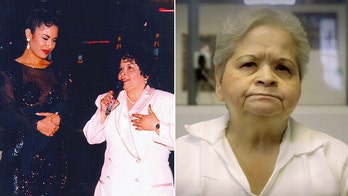
September 5, 2014. Actor Ethan Hawke arrives for the screening of the movie "Good Kill," at the 71st edition of the Venice Film Festival in Venice, Italy. (AP2014)
On the red carpet, the Venice Film Festival has had glitz and glamour, the snap of camera shutters — and the sting of mosquitoes. On-screen, it's had war, death and depression, both emotional and economic.
The 11-day movie extravaganza wraps up Saturday by awarding its top prize, the Golden Lion. But if the festival's lineup is anything to go by, the world's filmmakers are in a somber rather than celebratory mood.
Many of the 20 competing films were tales of suffering and strife.
There was Ethan Hawke's conscience-troubled drone pilot fighting the war on terror in Andrew Niccol's "Good Kill," and the starving Japanese soldiers driven to madness in Shinya Tsukamoto's "Nobi: Fires on the Plain."
War also drove stories of endurance in David Oelhoffen's "Far From Men," with Viggo Mortensen as a teacher dragged into Algeria's battle for independence; and Fatih Akin's "The Cut," which starred Tahar Rahim as an Armenian man searching for his daughters after the massacres by Ottoman Turks a century ago.
Festival director Alberto Barbera said the focus on war was no surprise: "We are living in dangerous times."
Economic uncertainty also flickered across the screen. An economically bruised America was the backdrop for Ramin Bahrani's Florida-set foreclosure tale "99 Homes" and Ami Canaan Mann's riding-the-rails romance "Jackie and Ryan." Tough times also plagued the characters in Iranian director Rakhshan Bani-Etemad's Tehran-set "Tales."
Two of the most talked-about performances were by actors playing men battered by life. Al Pacino was a small-town Texas locksmith trapped in the past in David Gordon Green's "Manglehorn." Michael Keaton used memories of his "Batman" years to brilliant effect as an aging actor trying to regain his creative spark in Alejandro Gonzalez Inarritu's "Birdman."
There were a few glimmers of hopeful humanity: the teenager meeting his estranged father and learning to love music in Alix Delaporte's "The Last Hammer Blow"; the bleak but humane absurdum of Swedish director Roy Andersson's "A Pigeon Sat on a Branch Reflecting on Existence." The world's oldest film festival, now in its 71st year, prides itself on chic Italian sophistication, with a romantic setting — apart from the mosquitoes — on Venice's lush Lido island. Emma Stone, Owen Wilson, Uma Thurman, James Franco, Charlotte Gainsbourg and Pacino — twice — were among the stars who walked the red carpet outside the Palazzo del Cinema.
But these are hard times for Venice and other film festivals, which are traditionally a way for movies to debut with a splash and build awards-season buzz. Competition for the big movies has grown fierce. Venice is up against rivals including Toronto and Telluride, both of which overlap it.
Barbera said he got "95 percent" of the films he wanted this year — but he lost out on a couple of big ones, including David Fincher's "Gone Girl," which will premiere at the New York Film Festival. The film industry is also in flux, with many movies struggling to get funding and distribution. Digital technology has transformed the way movies are made and viewed, shaking up the industry's traditional business model.
But actor John Leguizamo, in Venice with modern-dress Shakespeare adaptation "Cymbeline," said film festivals were still essential.
"I think they remind Hollywood, or tell Hollywood, what they should appreciate," he said. "Festivals are the guardians, the protectors of quality."






